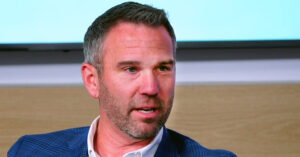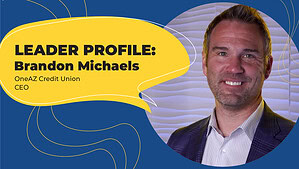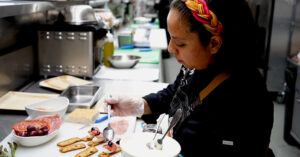ERIC SPERLING, HOST
Transformational Leadership from Community Conversations
Last spring the Washington Post referred to America as an “anger incubator.”
This was after a chain reaction of protests erupted across the world and in Arizona after the killing of George Floyd by a Minneapolis police officer.
But, nearly one year later, racially motivated violence continues to traumatize and exhaust all communities. Not much has changed and it’s clear that society’s mindset and work ethic to progress is laying a trap instead of a path out of this cycle.
Anger is a necessary and powerful emotion. How can communities use it to ignite action?
Community Collaborative brings leaders from communities across Arizona together to have conversations about diversity, equity and inclusion (DEI). The goal of the series is to create a first-of-its-kind inclusion index to hold businesses and organizations accountable for DEI progress.
In this episode STN producers and featured guests from the Arizona Coyotes and Phoenix Pride discuss actionable ways to cultivate change.
Positive doesn’t have a singular definition, and so unfortunately for some, positive would be ‘let’s not talk about it’ and others would be ‘just comply when you encounter law enforcement’ ‒ so positive can’t be the universal answer.
Robin Reed CEO Black Chamber of Arizona Tweet
Measure Change
According to Reed the primary way to turn anger into action is by choosing measurable metrics. He says that the key metric to watch for is “a complete buy-in from everyone” and “active idea sharing and contribution effort.” All communities must recognize the role they play in the problem, and choose to make an effort each day through their actions.
There’s not a problem with anger. We are mad. Why would you not be? There’s not a problem with anger, there’s a problem with not trying to understand the anger and (not) doing what’s necessary to fix it and heal.
Lloyd Hopkins Executive Director Million Dollar Teacher Project Tweet
Understand the Core Issue
According to Hopkins, the most powerful way to use anger is as a tool for understanding fear. Why do police officers allow fear to overcome them to a point that they draw a gun instead of a taser? Why do they have that fear in the first place? Where does it come from? Asking these questions gets to the core of the problem, where transformative healing can take place.
It takes all of our communities. It’s not just the Black community or the Native American community, it’s all communities, including the white community. That’s what the Community Collaborative is all about: Where can we speak in one voice to be able to initiate and continue change.
Monica Villalobos CEO Arizona Hispanic Chamber of Commerce Tweet
Call It Out
“We should not have to make resiliency a lifestyle choice. We have to be able to say ‘this is right’ and ‘this is wrong,’” says Villalobos. She has nine and 11 year-old boys and explains that she no longer believes in a “grey area” when it comes to what is right and wrong. According to Villalobos parents need to stop sitting on the fence, and must be able to call things as they are.
Let’s use the power of sports to make a difference in people’s lives. That’s been the guiding light for me.
Xavier Guitierrez CEO Phoenix Coyotes Tweet
Align Actions with Values
Xavier Guitierrez is the first Latino CEO of the National Hockey League (NHL). But, he feels confident with the responsibility “being the first” presents one year into the role. He’s part of the largest female executive team in the NHL and out of all of the sports franchises in Arizona.
“I have been very fortunate in my life to have experienced incredible opportunities and these are the roles we should be playing in,” says Guitierrez. He wants to inspire, unite and bring joy to communities. This perspective makes him comfortable to be in a position that opens doors for others.
When it comes to taking action towards progress, Guitierrez isn’t afraid to take a stand for values. He was hired to work for the Arizona Coyotes during a change in leadership and ownership at the organization. After the franchise chose its first draft pick (ever) Guitierrez learned that the new team member had bullied a black mentally disabled classmate in the past.
Guitierrez gave the player a chance to take accountability for his actions. He believes people make mistakes when they are young, and people should have an opportunity to redeem themselves. But, the player declined to step-up and the contract was terminated. Despite external pressure, Guitierrez was not willing to compromise the values of the organization. When it comes to finding talent Guitierrez’s philosophy is to approach the situation with the intent of finding the best and to be open-minded.
People trust the business community more than they trust politicians right now. . . So as the business community we have to continue fostering those relationships by showing that we’re willing to take stands on contentious issues by showing we’re willing to be intentionally inclusive and diverse with our workforce.
Ryan Starzyk Vice President Phoenix Pride and CEO BlueFire Group Tweet
Create a Bridge
“We need our allies as much as our community,” says Starzyk. He wants Phoenix Pride and the LGBTQ+ community to be open to people with all beliefs and backgrounds.
Starzyk, who is a veteran, wants to address the complicated relationship between the LGBTQ+ community and various religious and conservative groups by creating a welcoming bridge.
Over the past decade Starzyk has noticed the Phoenix business community step-up to create a more open door when it comes to cultural diversity.
“We’re seeing the business community be a very vital component to promoting inclusion and diversity. People trust the business community more than they trust politicians right now. . . So as the business community we have to continue fostering those relationships by showing that we’re willing to take stands on contentious issues by showing we’re willing to be intentionally inclusive and diverse with our workforce,” says Starzyk.
Be An Incubator for Change
Is inaction what’s holding society back from breaking its cycle of racism and discrimination? What are Americans afraid to lose?
Solving problems with diversity, equity and inclusion may feel too big to take on. But, the key to true change might be in the seemingly small personal choices each person makes everyday.
The choice to make an effort, the choice to question bias, the choice to establish and stand for values are accessible actions to everyone. At an individual level, taking these actions may not seem significant enough to spur change.
Remember that each community is an incubator for ideas and growth. If the individuals are static the community decays. But, dynamic individuals create communities that grow.





